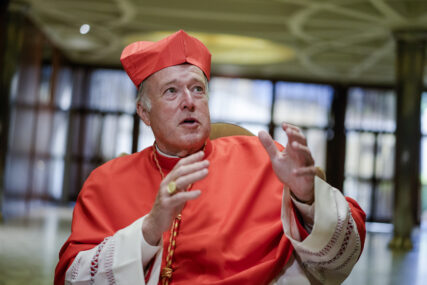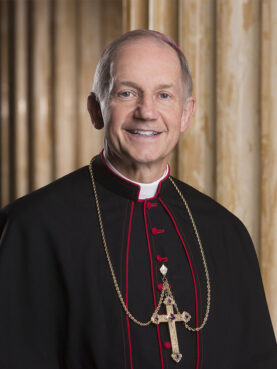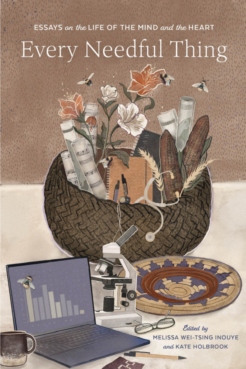In accusing Cardinal McElroy of heresy, Bishop Paprocki was aiming higher
The American episcopate’s anti-Francis faction takes it to a new level.

(RNS) — On Feb. 28, the Catholic bishop of Springfield, Illinois, Thomas Paprocki, accused the newest American cardinal, San Diego Bishop Robert McElroy, of heresy.
Not that Paprocki made so bold as to call out McElroy by name. In a Feb. 28 essay, “Imagining a Heretical Cardinal,” on the website of the magazine First Things, the bishop began by quoting directly from an article McElroy had published in the Jesuit magazine America a month earlier:
Imagine if a cardinal of the Catholic Church were to publish an article in which he condemned “a theology of eucharistic coherence that multiplies barriers to the grace and gift of the eucharist” and stated that “unworthiness cannot be the prism of accompaniment for disciples of the God of grace and mercy.”
Anyone who plugged the quotes into a search engine did not have to imagine for long.

Newly created Cardinal Robert W. McElroy, bishop of San Diego, attends a reception for relatives and friends in the Paul VI Hall at the Vatican on Aug. 27, 2022. (AP Photo/Andrew Medichini)
Paprocki then proceeded to a second imaginary: “Or what if a cardinal of the Catholic Church were to state publicly that homosexual acts are not sinful and same-sex unions should be blessed by the Church?”
Public statements along those lines have been made by Luxembourg Cardinal Jean-Claude Hollerich, not McElroy — though a reader might think otherwise. In his America article, McElroy concerned himself with the question of whether access to the Eucharist should be permitted to the divorced and remarried and to sexually active LGBT people.

Bishop Thomas J. Paprocki in 2018. Photo courtesy of the Diocese of Springfield in Illinois
McElroy took the position that members of both groups should be so permitted for the reasons of “eucharistic conherence” that Paprocki quoted in his response. The Springfield bishop pronounced the remarks heretical and proceeded to cite canon law indicating that those holding heretical views are automatically excommunicated from the Catholic Church.
But, Paprocki continued, since a cardinal can only be removed from office by the pope, one who is automatically excommunicated (i.e., McElroy) might get to vote for the next pope. “We must pray,” Paprocki piously concluded, “that the Holy Spirit will not let this happen, and will inspire anyone who espouses heretical views to renounce them and seek reconciliation with our Lord and his Church.”
I guess Paprocki figured there’s no way the present pope would himself avert the danger by removing the heretical cardinal in question from office. And with good reason.
After all, in his 2013 apostolic exhortation “Evangelii Gaudium” (The Joy of the Gospel), Pope Francis wrote:
The Eucharist, although it is the fullness of sacramental life, is not a prize for the perfect but a powerful medicine and nourishment for the weak. These convictions have pastoral consequences that we are called to consider with prudence and boldness. Frequently, we act as arbiters of grace rather than its facilitators. But the Church is not a tollhouse; it is the house of the Father, where there is a place for everyone, with all their problems.
In his 2016 exhortation “Amoris Laetitia” (Love’s Happiness), Francis declared that it “can no longer simply be said that all those in any ‘irregular’ situation are living in a state of mortal sin and are deprived of sanctifying grace.” And that “science needs to be better incorporated into the Church’s praxis in certain situations which do not objectively embody our understanding of marriage.”
And: “At times we find it hard to make room for God’s unconditional love in our pastoral activity. We put so many conditions on mercy that we empty it of its concrete meaning and real significance.”

Pope Francis speaks during an interview with The Associated Press at the Vatican, Jan. 24, 2023. (AP Photo/Andrew Medichini)
Did I mention that, to the consternation of some conservative prelates and laity, the pope in fact did, in Chapter 8 of “Amoris Laetitia,” give bishops the power to grant divorced and remarried persons access to the Eucharist?
No one should have the slightest doubt that the McElroy remarks condemned as heresy by Paprocki convey precisely Francis’ magisterial teaching — indeed, that the pope’s injunction to “make room for God’s unconditional love in our pastoral activity” is clearly mirrored in McElroy’s advocacy of a “radical inclusion” of some people whose sexual activity outside of church-sanctioned marriage violates church doctrine.
If McElroy pushed the envelope, it was by extending the pope’s principles to sexually active LGBTQ persons. But that’s not where Paprocki brought his hammer down. He brought it down on the principles themselves — effectively applying the same automatic excommunication he assigned to McElroy to Francis himself.
It’s hard to imagine a bishop affronting any other pope in this way with impunity.












